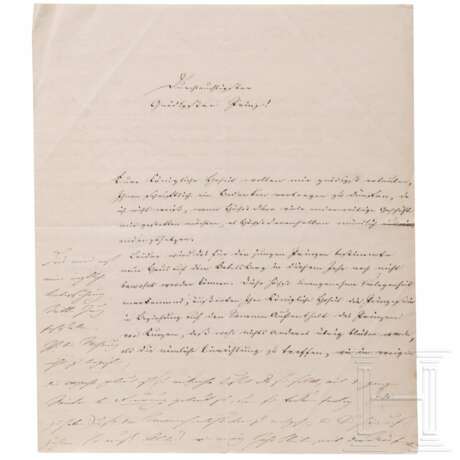Kaiser Wilhelm I. (1797 - 1888) - eigenhändige und signierte Antwort an den Militärgouverneur von Unruh seines Sohnes Prinz Friedrich Wilhelm, 1841
28.04.2025 10:00UTC +01:00
Classic
Starting price
650EUR € 650
| Auctioneer | Hermann Historica |
|---|---|
| Event location | Germany, Grasbrunn / München |
| Buyer Premium | 25 % |
Archive
The auction is completed. No bids can be placed anymore.

ID 1413276
Lot 537 | Kaiser Wilhelm I. (1797 - 1888) - eigenhändige und signierte Antwort an den Militärgouverneur von Unruh seines Sohnes Prinz Friedrich Wilhelm, 1841
Die Antwort Wilhelms am Rand eines dreiseitigen Briefes des Militärgouverneurs Oberst Karl von Unruh (1786 - 1852) seines Sohnes (der spätere Kaiser Friedrich III.). Der Oberst, damals auch Adjutant von Wilhelm und bereits schwer erkrankt, meldet Bedenken an, dass er sich erneut ein Zimmer auf Schloss Babelsberg mit dem Erzieher des Prinzen teilen müsse, da "das für den jungen Prinzen bestimmte neue Haus auf dem Babelsberg in diesem Jahr noch nicht bewohnt werden" könne, "diese demüthigende Stellung habe ich vor zwey Jahren [.] nur zu bitter kennengelernt."
Wilhelms leicht mürrische Antwort (zunächst hinsichtlich von Unruhs Erkrankung): "Dies wird erst eine ärztliche Untersuchung Mitte Juny feststellen. Ist die Wohnung nicht zu beziehen, die express gebaut ist (u. vielmehr kostet als sie sollte, weil 2 ganze Winter die Feuerung gebrannt ist, um sie trocken fertig zu haben:) um so den Unannehmlichkeiten zu entgehen, die Sie hier aufzählen, so muß Alles wie vorig Jahr bleiben, mit der Modification daß Sie so wohl als auch Godet (Anm.: Frédéric Godet, Erzieher), ihre Wohnung im anderen Haus erhalten. [.] Demnach haben Sie beide sich abzulösen in der Wohnung [.] Etwas Anderes ist beim besten Willen nicht zu machen, denn wo nichts ist, hat selbst der Papst sein Recht verlohren.".
Der in Tinte verfasste Brief von Unruhs datiert "Berlin 19. Mai 1841" und signiert "v.Unruh", die ebenfalls in Tinte verfasste Antwort und Unterschrift Wilhelms datiert "20/5 41". Gefaltet, kleine Randschäden.
Karl von Unruh wird im März 1838 Oberst und persönlicher Adjutant des Prinzen Friedrich Wilhelm, ab Oktober zudem Militärgouverneur des Prinzen. Aufgrund seiner Erkrankung scheidet er 1840 aus der Adjutantur aus, wird 1844 zum Generalmajor befördert, gibt noch im selben Jahr die militärische Erziehung ab. 1849 wird er mit dem Charakter eines Generalleutnants in den Ruhestand versetzt.
Kaiser Wilhelm I. wird 1840, nach dem Tod seines Vaters König Friedrich Wilhelm III., durch seinen Bruder, König Friedrich Wilhelm IV., zum Thronfolger bestimmt und erhält den Titel des Prinzen von Preußen. Erst zwanzig Jahre später wird er preußischer König und weitere zehn Jahre später deutscher Kaiser.
Emperor Wilhelm I (1797 - 1888) - a handwritten and signed reply to the military tutor von Unruh of his son Prince Friedrich Wilhelm, 1841
Emperor Wilhelm I (1797 - 1888) - a handwritten and signed reply to the military tutor von Unruh of his son Prince Friedrich Wilhelm, 1841
Die Antwort Wilhelms am Rand eines dreiseitigen Briefes des Militärgouverneurs Oberst Karl von Unruh (1786 - 1852) seines Sohnes (der spätere Kaiser Friedrich III.). Der Oberst, damals auch Adjutant von Wilhelm und bereits schwer erkrankt, meldet Bedenken an, dass er sich erneut ein Zimmer auf Schloss Babelsberg mit dem Erzieher des Prinzen teilen müsse, da "das für den jungen Prinzen bestimmte neue Haus auf dem Babelsberg in diesem Jahr noch nicht bewohnt werden" könne, "diese demüthigende Stellung habe ich vor zwey Jahren [.] nur zu bitter kennengelernt."
Wilhelms leicht mürrische Antwort (zunächst hinsichtlich von Unruhs Erkrankung): "Dies wird erst eine ärztliche Untersuchung Mitte Juny feststellen. Ist die Wohnung nicht zu beziehen, die express gebaut ist (u. vielmehr kostet als sie sollte, weil 2 ganze Winter die Feuerung gebrannt ist, um sie trocken fertig zu haben:) um so den Unannehmlichkeiten zu entgehen, die Sie hier aufzählen, so muß Alles wie vorig Jahr bleiben, mit der Modification daß Sie so wohl als auch Godet (Anm.: Frédéric Godet, Erzieher), ihre Wohnung im anderen Haus erhalten. [.] Demnach haben Sie beide sich abzulösen in der Wohnung [.] Etwas Anderes ist beim besten Willen nicht zu machen, denn wo nichts ist, hat selbst der Papst sein Recht verlohren.".
Der in Tinte verfasste Brief von Unruhs datiert "Berlin 19. Mai 1841" und signiert "v.Unruh", die ebenfalls in Tinte verfasste Antwort und Unterschrift Wilhelms datiert "20/5 41". Gefaltet, kleine Randschäden.
Karl von Unruh wird im März 1838 Oberst und persönlicher Adjutant des Prinzen Friedrich Wilhelm, ab Oktober zudem Militärgouverneur des Prinzen. Aufgrund seiner Erkrankung scheidet er 1840 aus der Adjutantur aus, wird 1844 zum Generalmajor befördert, gibt noch im selben Jahr die militärische Erziehung ab. 1849 wird er mit dem Charakter eines Generalleutnants in den Ruhestand versetzt.
Kaiser Wilhelm I. wird 1840, nach dem Tod seines Vaters König Friedrich Wilhelm III., durch seinen Bruder, König Friedrich Wilhelm IV., zum Thronfolger bestimmt und erhält den Titel des Prinzen von Preußen. Erst zwanzig Jahre später wird er preußischer König und weitere zehn Jahre später deutscher Kaiser.
Condition: II
| Auction house category: | Prussia: Ruling house of Hohenzollern |
|---|
| Auction house category: | Prussia: Ruling house of Hohenzollern |
|---|
| Address of auction |
Hermann Historica Bretonischer Ring 3 85630 Grasbrunn / München Germany | ||||||||||||||
|---|---|---|---|---|---|---|---|---|---|---|---|---|---|---|---|
| Preview | |||||||||||||||
| Phone | +49 (0)89 5472 649 0 | ||||||||||||||
| Fax | +49 (0)89 5472 64999 | ||||||||||||||
| Buyer Premium | 25 % | ||||||||||||||
| Conditions of purchase | Conditions of purchase | ||||||||||||||
| Business hours | Business hours
|


